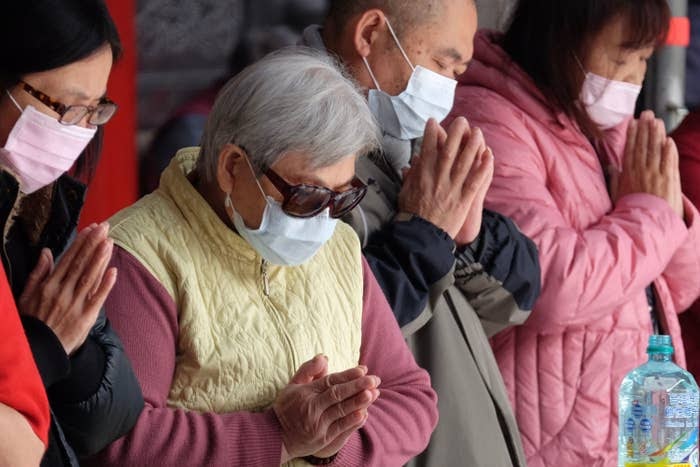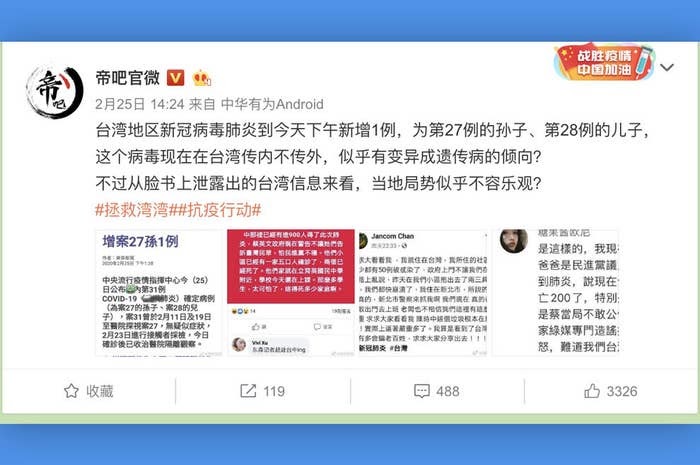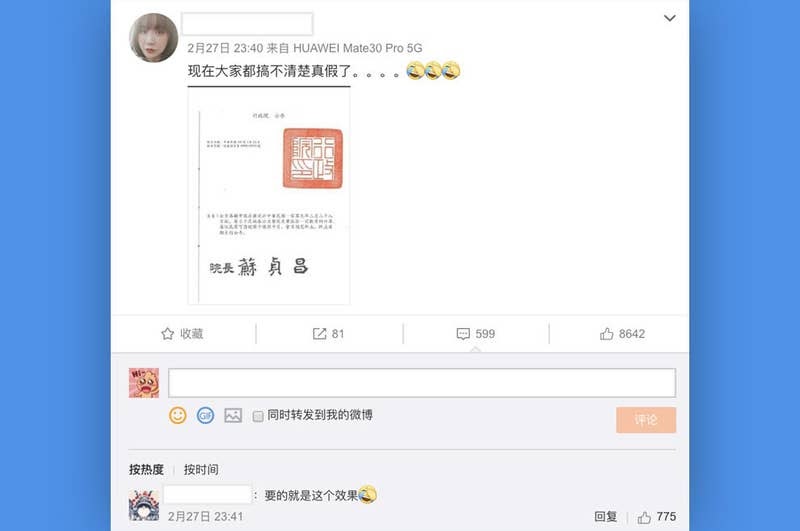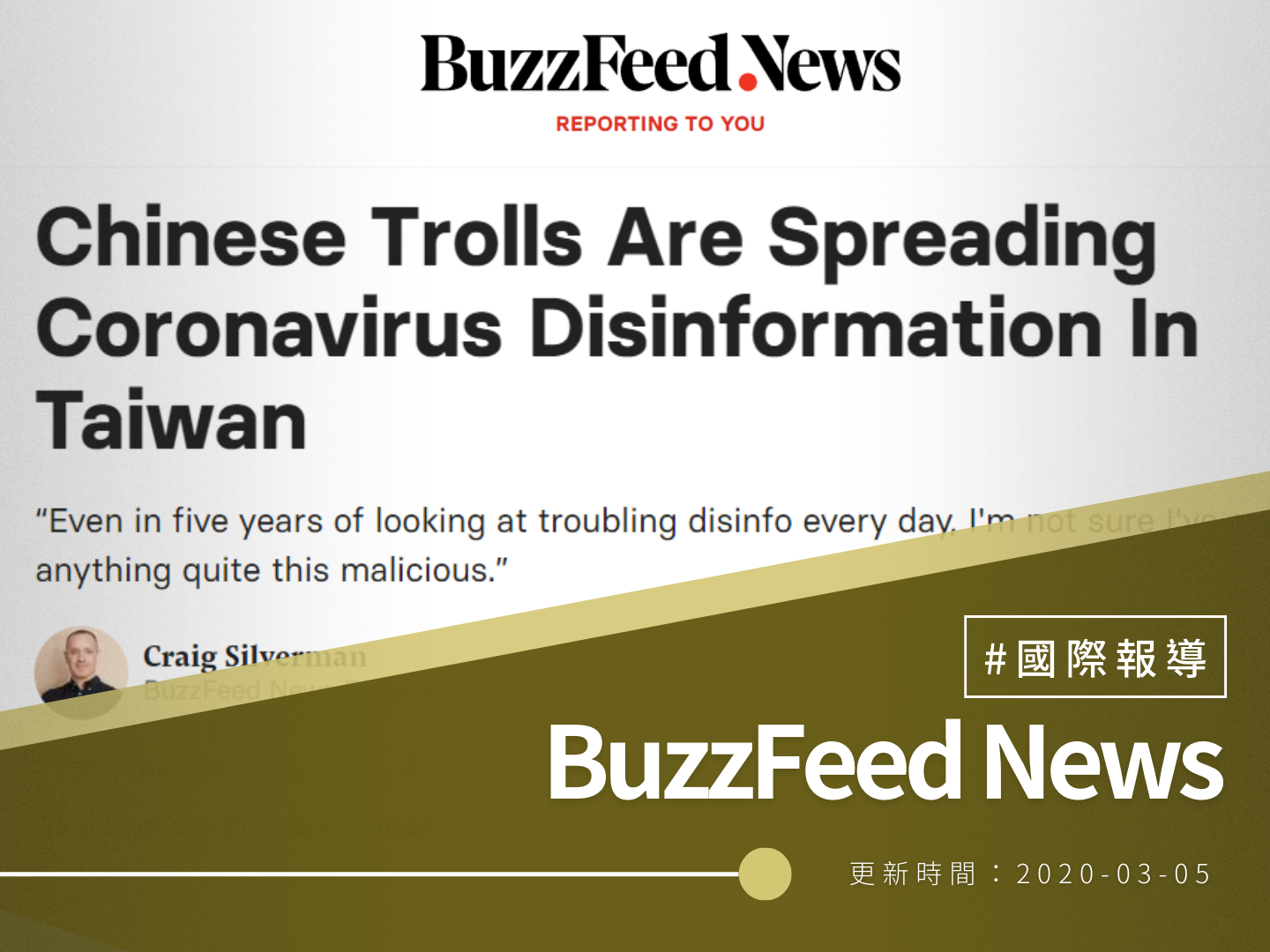【BuzzFeed News】Chinese Trolls Are Spreading Coronavirus Disinformation In Taiwan
【2020年3月5日 BuzzFeedNews/Trending/CORONAVIRUS】
“Even in five years of looking at troubling disinfo every day, I'm not sure I've ever seen anything quite this malicious.”
Craig Silverman
BuzzFeed News Reporter
Posted on March 5, 2020, at 1:42 p.m. ET

Devotees wearing protective masks pray at the Lungshan Temple in Taipei on Jan. 28.
Sam Yeh / Getty Images
The messages appeared on Facebook at the end of February, each making the same explosive claim: Taiwan’s government had lied about the number of coronavirus infections and deaths.
The posts, written in Mandarin, claimed an unnamed Taiwanese legislator was secretly revealing the cover-up. “I’m really angry right now, don’t the Taiwanese deserve to know these things?” the posts said.
The content from the Facebook posts were also shared on Weibo, a major Chinese social media platform, and similar claims spread on Twitter and YouTube.
The claim was false, and rapidly shown to be so by the Taiwan FactCheck Center, a nonprofit reporting organization. Taiwan’s government has not been lying about the number of cases, which currently stands at 44, including one death.
This claim, and other false ones targeting Taiwan, was part of a coordinated disinformation campaign launched by people in mainland China across multiple social platforms, according to researchers at the Digital Intelligence Lab at the Institute for the Future, a social science research group based in California. It offers new examples of Chinese internet users spreading fear and distrust in Taiwan over the deadly virus.
“Often the term [foreign interference] implicitly assumes a state actor, but this campaign appears to be a notable instance of a citizen-led, grassroots foreign disinformation attack,” said Nick Monaco, the head of the of Digital Intelligence Lab and a researcher of Chinese-language disinformation.
“Even in five years of looking at troubling disinfo every day, I'm not sure I've ever seen anything quite this malicious.”
As of now, there is no evidence of Chinese state involvement. Instead, it appears mainland Chinese internet users chose to target Taiwan with disinformation for patriotic reasons and online bragging rights. On its website, Taiwan’s Ministry of Justice said the campaign may have been inspired by a recent decision to curtail exports of face masks, which angered some in China.
Monaco said the campaign bore hallmarks of a Chinese troll group known as Diba.
“They organize ‘expeditions’ on forums and message boards,” Monaco said. “These expeditions involve large numbers of users jumping the Great Firewall to promote coordinated messaging, frequently targeting Taiwan and Hong Kong with patriotic — and often derogatory — Chinese messages, which often align with the official CCP party line.”
Diba’s Weibo account shared some of the false Facebook messages, but Monaco said he could not fully confirm whether the group created them.

Dibo's Weibo account shared some of the false Facebook messages.
Weibo
Monaco did find the origin of two false claims about the coronavirus in Taiwan when investigating on Weibo. In both cases, users publicly admitted to spreading disinformation about Taiwan’s response to coronavirus.
“How bad am I? Went on fb and spread rumors about veggie,” wrote one, using a pun for Taiwan’s recently reelected president, Tsai Ing-wen.
Another user admitted they created and shared a fake Taiwanese government document that said citizens in Taiwan would receive 10 free surgical masks. “Now no one can tell if it’s real or fake,” they said.
But that document contained clues that linked it to mainland China.
Monaco said it was mostly written using traditional characters, the Chinese writing system used in Taiwan. But it also included at least one simplified character, which are used in mainland China. The Taiwan FactCheck Center also identified social messages that used characters and phrases that point to mainland China.

A Weibo user bragged about creating a false government document.
Weibo
The effort didn’t generate much organic engagement, but it did keep local fact-checkers busy. The Taiwan FactCheck Center said it found nine false claims between Feb. 23 and Feb. 29 that originated with accounts it said are run in mainland China. The disinformation included claims that members of the Taiwanese military were infected and students were being kept home from school.
“Fact-checkers in Taipei have relied on exhausted doctors, nurses and experts to separate facts from fiction. But the amount of disinformation is reaching surprising levels,” wrote Summer Chen and Huian Ho, the editor-in-chief and a reporter at TFCC in a March 3 post for Poynter.org.
Monaco said people involved in the disinformation campaign likely wanted to sow panic and mistrust in Taiwan, and to brag about their exploits, while bolstering nationalism in mainland China.
“The audience is really twofold in this case — on one hand, there's a show-off element of trolls bragging to their friends about what they've done — this would be a domestic, Chinese audience,” he said. “On the other hand, sowing panic and distrust among the Taiwanese population, especially towards their newly reelected president and her party, are goals of this campaign that are clearly aimed at the Taiwanese themselves.”
It’s also notable that a central claim of the disinformation campaign — that Taiwan’s government has been concealing the true nature of the outbreak — is something China’s government has been criticized for.
As of now, many of the false posts remain online and still pose a risk, according to Chen and Ho of the TFCC.
“Continued presence of these rumors on social media presents a danger of muddying the waters and further destabilizing an already volatile situation,” they said.
報導網址






